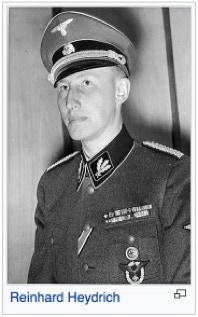Where the Two Armies Met
To click on any of the blue links-press the command key to open a separate page.
Reinhard Heydrich
From Wikipedia, the free encyclopedia
Many historians regard him as the darkest figure within the Nazi elite; Adolf Hitler described him as "the man with the iron heart".[4] He was the founding head of the Sicherheitsdienst (SD), an intelligence organisation charged with seeking out and neutralising resistance to the Nazi Party via arrests, deportations, and murders. He helped organise Kristallnacht, a series of co-ordinated attacks against Jews throughout Nazi Germany and parts of Austria on 9–10 November 1938. The attacks, carried out by SA stormtroopers and civilians, presaged the Holocaust. Upon his arrival in Prague, Heydrich sought to eliminate opposition to the Nazi occupation by suppressing Czech culture and deporting and executing members of the Czech resistance. He was directly responsible for the Einsatzgruppen, the special task forces which travelled in the wake of the German armies and murdered over two million people, including 1.3 million Jews, by mass shooting and gassing.
On the 20th of January, 1942 fifteen major players in Hitler’s regime met to discuss the official policy toward Jews. They debated levels of “Jewishness” and how to treat other non-Aryan peoples. The conference was managed by Reinhard Heydrich who was, perhaps, the most evil of all Hitler’s staff. He was determined to make extermination of Jews official state policy by getting all branches to agree to its implementation. In this he was completely successful.
Heydrich orchestrating the agenda at the Wannsee.
